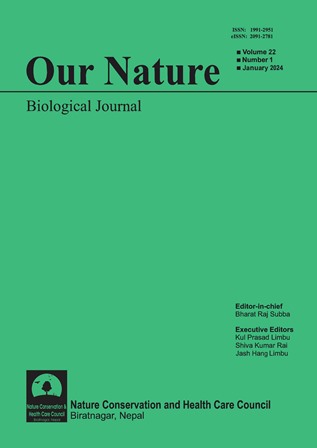Assessment of Species Composition, Diversity and Carbon Stock in a Community Managed Forest of Udaypur District of Nepal
DOI:
https://doi.org/10.3126/on.v22i1.67349Keywords:
Biomass, Climage change, Carbon sequestration, Importance value indexAbstract
Species composition, diversity, and carbon sock of forests are all critical factors that affect the ability of forests to provide various important ecosystem services. However, there is a notable dearth of research regarding these factors in the community forests of Udaypur district. Therefore, this research was undertaken to assess species composition, and biodiversity and quantify the carbon stock potential of the Sringar community forest (CF) of the Udaypur district of Eastern Nepal. A total of 57 circular plots of 500m2 were inventoried using a systematic random sampling method with 0.5 % sampling intensity. In the CF, 17 tree species from 15 genera and 11 families were identified. The dominant tree species, Shorea robusta observed with a maximum importance value index (IVI) (176.15). According to our study, the total biomass and carbon stock in Sringar CF were 276.98 ton ha-1 and 138.18 ton ha-1, respectively. Accurate estimation of soil carbon stocks is crucial for long-term forest management and climate change mitigation, and the integration of advanced monitoring techniques and predictive models to enhance accuracy and account for future climate projections is needed.
Downloads
Downloads
Published
How to Cite
Issue
Section
License
Copyright (c) 2024 The Author(s)

This work is licensed under a Creative Commons Attribution-NonCommercial 4.0 International License.
This license enables reusers to distribute, remix, adapt, and build upon the material in any medium or format for noncommercial purposes only, and only so long as attribution is given to the creator.




